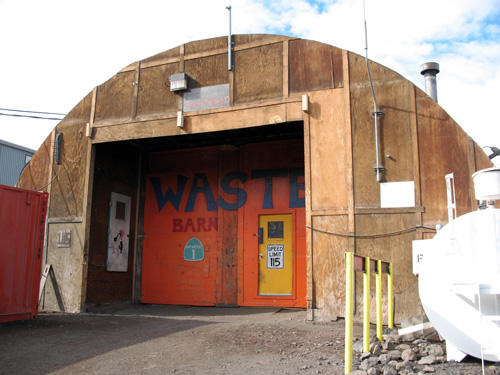 A couple of posts ago I described how McMurdo residents sort their trash into at least a dozen different categories. This community effort allows the US Antarctic Program to recycle an impressive 65-68% of its trash annually. I decided to pay a visit to the Waste Management department to learn more, and found it operating out of, where else, but a recycled Quonset hut named the Waste Barn.
A couple of posts ago I described how McMurdo residents sort their trash into at least a dozen different categories. This community effort allows the US Antarctic Program to recycle an impressive 65-68% of its trash annually. I decided to pay a visit to the Waste Management department to learn more, and found it operating out of, where else, but a recycled Quonset hut named the Waste Barn. 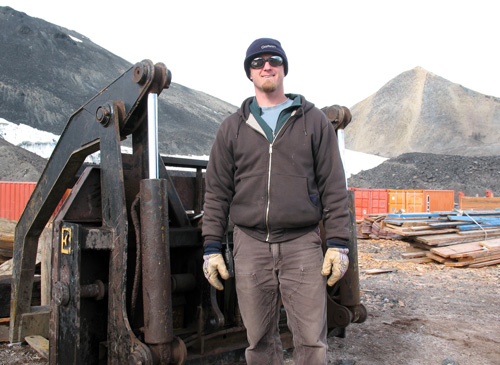 I was welcomed by James Van Matre, McMurdo's Waste Management Supervisor, who kindly gave me a truck tour of the refuse yards and milvan lots around town. Milvans are military cargo vans -- the large metal containers that everything gets shipped out in.
I was welcomed by James Van Matre, McMurdo's Waste Management Supervisor, who kindly gave me a truck tour of the refuse yards and milvan lots around town. Milvans are military cargo vans -- the large metal containers that everything gets shipped out in. 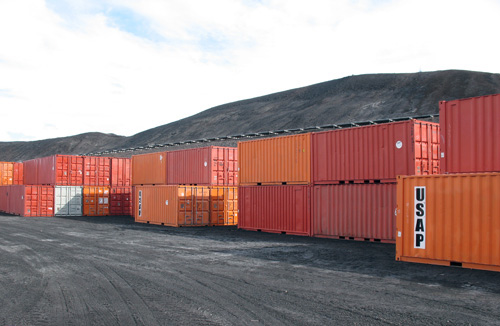 And ultimately, everything does get shipped out. As I mentioned in my introductory blog, the USAP's policy is to remove nearly 100% of its refuse from the continent for proper disposal. "What comes in must eventually go out," states the Program literature. That commitment and its potential to work as a model for managing waste in other environments is what sparked my project and interest in documenting the USAP system.
And ultimately, everything does get shipped out. As I mentioned in my introductory blog, the USAP's policy is to remove nearly 100% of its refuse from the continent for proper disposal. "What comes in must eventually go out," states the Program literature. That commitment and its potential to work as a model for managing waste in other environments is what sparked my project and interest in documenting the USAP system. 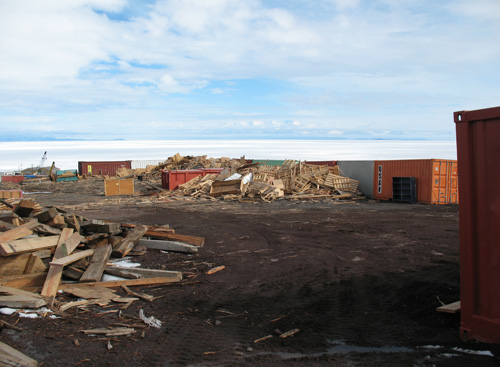 So, I wondered, given the Program's diligence in shipping all its refuse out, why was there stuff everywhere? Simple, James explained. There's but a single vessel per year that hauls the garbage off McMurdo, and it last visited 50 weeks ago. We're surrounded by nearly a year's worth of accumulated rubbish, and the next ship is due in a couple weeks.
So, I wondered, given the Program's diligence in shipping all its refuse out, why was there stuff everywhere? Simple, James explained. There's but a single vessel per year that hauls the garbage off McMurdo, and it last visited 50 weeks ago. We're surrounded by nearly a year's worth of accumulated rubbish, and the next ship is due in a couple weeks. 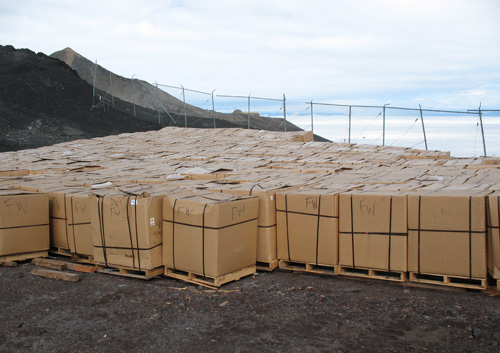 It'll be a big ship, relieving McMurdo of about 420 milvans full of waste (many filled to their 40,000 lb. capacity) plus about 30 more containing resale material. It's not just McMurdo's trash; all of South Pole Station's refuse ends up here too, as well as that of the field camps supported by the stations.
It'll be a big ship, relieving McMurdo of about 420 milvans full of waste (many filled to their 40,000 lb. capacity) plus about 30 more containing resale material. It's not just McMurdo's trash; all of South Pole Station's refuse ends up here too, as well as that of the field camps supported by the stations. 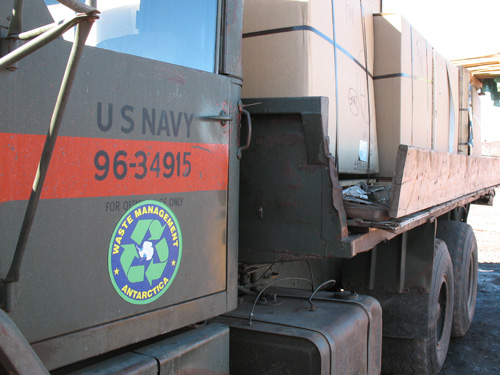 Does that mean that McMurdo will be gloriously void of milvans in two weeks' time? Not quite. This ship, in addition to serving as the annual garbage remover, also serves as the annual supply vessel loaded with containers full of provisions for McMurdo's next 52 weeks. It's an ongoing swap in the service of minimizing environmental impact on the continent. James has invited me back to the Waste Barn tomorrow. Join me for the action inside and its role in Antarctica's recycling system.
Does that mean that McMurdo will be gloriously void of milvans in two weeks' time? Not quite. This ship, in addition to serving as the annual garbage remover, also serves as the annual supply vessel loaded with containers full of provisions for McMurdo's next 52 weeks. It's an ongoing swap in the service of minimizing environmental impact on the continent. James has invited me back to the Waste Barn tomorrow. Join me for the action inside and its role in Antarctica's recycling system.